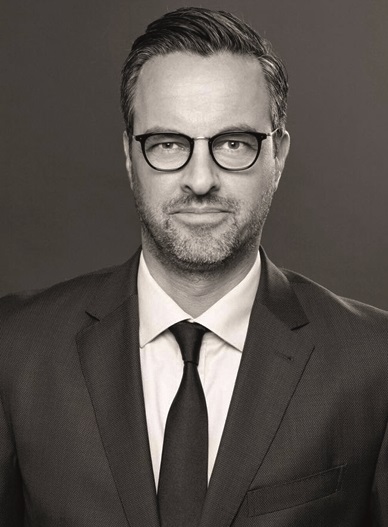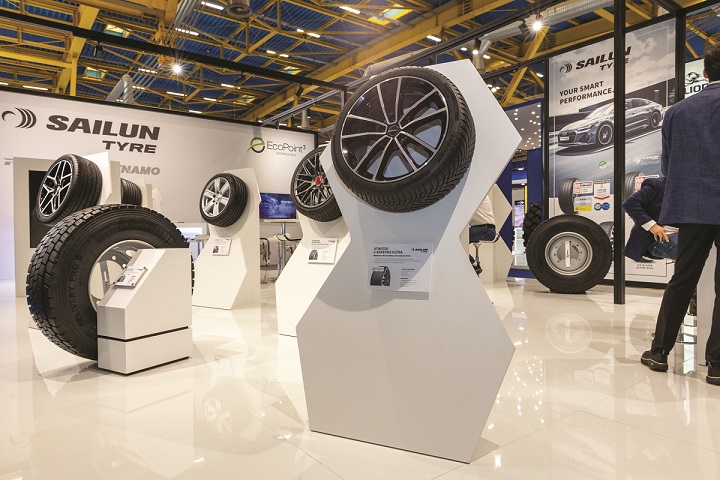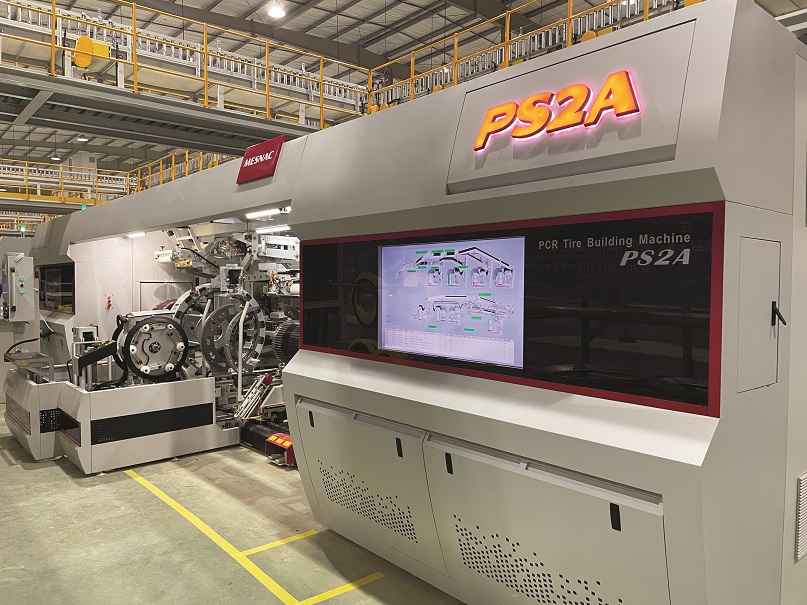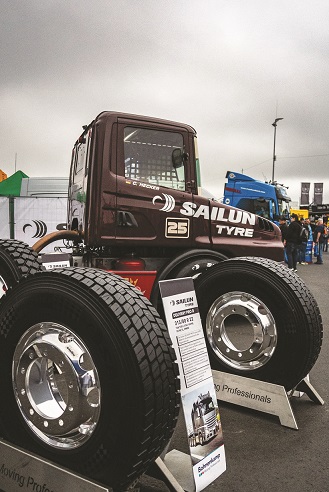Profiling In Complexity
- By Sharad Matade & Gaurav Nandi
- August 14, 2025

In Europe’s fragmented but fiercely profitable tyre market, success is hard-won and short-lived. The continent offers scale, premium pricing and OEM proximity, but it also throws up formidable barriers in the form of legal complexity, consumer conservatism and entrenched legacy players. While many Asian tyre makers continue to struggle for relevance, international Sailun Group has quietly rewritten that script. Combining academic roots, machinery expertise and agile ownership, it has grown into a global force. Now, with rising brand visibility, the company is challenging old assumptions.
Every tyre manufacturer from any nook and cranny of the world wants a piece of the European tyre market. The obvious reasons include higher profitability, consumer spending capacity and the lot. However, it’s easier said than done for entering such a varied and high-profile tyre economy. Tyre manufactures from many Asian countries continue the struggle to penetrate the European tyre scene. And some have been steadfast and persistent enough to have finally commenced operations running in the continent.
International tyre major Sailun Group is one such company that has its presence in the European market for the over a decade. Tyre Trends caught up with Sailun Tyre Europe’s Director of Marketing, Stephan Cimbal, at a recent expo.
He noted that the European market is one of the largest and arguably the most complex tyre markets in the world. It’s not a single market but rather 40 individual ones, each with its own language, regulations and consumer behaviour.
 “Despite its fragmentation, Europe remains one of the most profitable regions thanks to its high price levels and concentration of major original equipment manufacturers. If you can succeed in Europe, chances are you’ll find success in other global markets as well,” he added.
“Despite its fragmentation, Europe remains one of the most profitable regions thanks to its high price levels and concentration of major original equipment manufacturers. If you can succeed in Europe, chances are you’ll find success in other global markets as well,” he added.
When Sailun Tyre Europe began its European journey just over a decade ago, few in the industry could have predicted how swiftly the brand would rise. According to the executive, it ranks among the 10 most valuable tyre brands in the world today.
Cimbal recalls the group’s roots with quiet pride. “It all began a little more than 20 years ago in Qingdao, China. We were founded out of the Qingdao University of Science and Technology, a think tank for rubber technology with 30,000 students and 4,000 faculty members doing nothing but research on rubber,” he explained.
That academic foundation proved crucial. Sailun Group’s founder Yuan Zhongxue still is also a university professor whose role has always been to turn scientific research into real-world industrial solutions. One of his earliest achievements was the establishment of a machinery company, now known as Mesnac, which went on to become a major force in tyre manufacturing equipment.
A few years later, Sailun was born, initially, to serve China’s domestic market. “Success came quickly. The tyres were well received and demand just kept growing,” noted Cimbal.
That early success at home soon gave rise to ambition abroad. After a successful foray into North America, a relatively straightforward market by comparison due to its unified legislation, Sailun Group turned its sights on Europe.
“It was maybe 12 or 13 years ago when we entered Europe. We started the usual way by partnering with local distributors, shipping containers, building the brand from the ground up. The approach worked. For nearly a decade, we quietly expanded our footprint, growing year on year. Then, almost suddenly, the brand recognition soared. We started to appear in the top 10 of European tyre magazines. That was unimaginable just a few years ago,” Cimbal recalled.
The executive noted that currently its European operations are expanding. While the traditional import-distribution model continues to thrive, the group is now actively exploring original equipment partnerships and deeper regional integration with its partners.
Alluding to how did a relatively young company muscle its way into a fiercely competitive, brand-driven industry, Cimbal noted, “It was a combination of entrepreneurial ownership, cutting-edge technology and a deep-rooted respect for branding. We are privately owned. That means we can move fast. We also benefit from Mesnac’s machinery expertise and the scientific horsepower of our university roots. We take the brand very seriously. For us, it’s more than a name, it’s a mindset, a promise.”
STAYING COMPETITIVE
As the European tyre market shifts towards premiumisation and larger tyres with higher margins, many established brands are closing plants that once made smaller-size products. The move reflects a strategy to reduce volume while increasing profitability with a focus on 18-inch and above sizes.
Yet, Sailun Tyre Europe sees the market differently. “We don’t believe small cars or small tyres will vanish in a year or two. People will still use them for years and we see that as an opportunity,” said Cimbal.

The company positions itself as a full-range manufacturer. “We do tyres for small cars, medium cars, big cars, trucks, excavators, tractors etc. If an established brand sells at a price index of 100 and we offer similar performance at 70 or 75, it gives the consumer a sense of making a smart choice. They feel like they got the same quality for less; it’s a psychological win,” noted Cimbal.
Sustainability is another pillar of the company’s strategy. With modern factories, including its latest plant in Cambodia, which is just 18 months old, Sailun Tyre Europe can not only claim sustainability but also prove it. “That’s especially important for original equipment customers. If your sustainability processes aren’t in place, they won’t even talk to you,” said Cimbal.
While the manufacturer offers tyres across all segments, the strongest volumes remain in passenger cars. However, the company highlights its strength in truck tyres, citing nearly a decade of proven quality and performance. Its off-the-road tyre brand has also seen strong uptake in agriculture and construction, where reliability and brand trust are critical.
“It’s not about being cheap. We aim to be more affordable than traditional brands but still offer a high-value, reliable product. That’s attractive to farmers, construction firms and mining operators alike,” the spokesperson added.
On the evolving trend of tyres-as-a-service, the company isn’t actively engaged yet.
MARKETS IN VIEW
While the group has seen success in both North America and Europe, the two markets are vastly different in structure, regulation and consumer behaviour.
“In North America, the market is dominated by maybe five to 10 major wholesalers. In Europe, you’re dealing with hundreds. The difference isn’t just about distribution; it goes to the heart of how tyres are sold, marketed and perceived,” explained Cimbal.
Vehicle diversity plays a role too. “In North America, you generally see a lot of big trucks and a strong budget segment. But in Europe, the car types vary hugely. The complexity doesn’t end there. With 15 to 17 separate national regulations governing things like winter and summer tyres, the European landscape is a maze of legal requirements. The complexity of Europe is pretty unique,” added Cimbal.
Branding adds yet another layer as European consumers are heavily influenced by brands. They’re premium-oriented, very technology-conscious and pay close attention to the look, feel and messaging of a brand.
This awareness has shaped how Sailun Tyre Europe presents itself as it tries to appear smart, clean and modern.
Becoming a global brand is no simple task particularly for a company rooted in China. Commenting on how the group achieved this feat, Cimbal said, “It’s a tough, long journey from being a local brand in China to becoming a global one. You need a global framework, but you must also adapt the brand to local markets. European consumers don’t care what your brand looks like in China or the US; they want something that speaks to them directly.”
BRANDING EDGE
Back in the 1970s, Chinese manufacturers were often just copying European designs and not always doing it well, noted Cimbal. But that changed quickly. They moved from simply imitating to matching quality levels and then very rapidly to improving on them, doing it better, faster and cheaper. That’s the real secret behind the success.

According to him, it’s China’s ability to learn quickly and apply those lessons at scale that underpins its industrial momentum. In the tyre sector, evolution has brought performance, reliability and competitive pricing to global markets. But as the industry matures, product quality alone is no longer enough.
“Tyres are a branding game. The quality is there but others also make good tyres. For most consumers, all tyres look the same. That is why brand strategy is becoming critical for Chinese firms. Unless you’re a race driver or a tyre expert, you can’t easily tell one tyre from another. So brand becomes the key differentiator. It’s a shift already playing out in the automotive world and tyre makers will need to follow suit. We think we have the right tools and experience to manage it,” he contended.
As Chinese tyre manufacturers move from replication to innovation, a quiet transformation is underway. Across the board, Chinese manufacturers are no longer aiming to match European standards but working to surpass them.
This shift, Cimbal believes, is already beginning to reshape how Chinese-made products are viewed, particularly by younger consumers. “The next generation is growing up with products that are simply ‘Made in China’. They don’t question the quality. That label doesn’t carry the same doubts it used to,” he noted.
And in this high-speed race, brand perception could be just as critical as performance.
GEO-POLITICS AND SUPPLY
With a growing global footprint and an increasingly agile supply chain, Sailun Group is navigating a complex mix of political, economic and industry-specific challenges.
The group currently operates ten manufacturing plants in China along with facilities in Cambodia, Vietnam, Indonesia and Mexico, and a European plant is on the horizon, though the timeline remains uncertain.
The move to diversify production isn’t just political but strategic. As the European Union considers new anti-dumping tariffs on Chinese tyre imports, many Asian companies, including Sailun Group, are shifting capacity abroad. “You have to decentralise anyway for economic reasons. Now, with the threat of protective tariffs, it just makes even more sense. But it’s not a new strategy. The solutions are already in place,” explained Cimbal.
Despite growing geo-political friction, the company retains a high level of logistical flexibility. It can shift sourcing and supply routes quickly as needed.
 In terms of product strategy, Sailun Tyre Europe remains committed to a balanced focus on both passenger car radial and truck and bus radial segments.
In terms of product strategy, Sailun Tyre Europe remains committed to a balanced focus on both passenger car radial and truck and bus radial segments.
Surprisingly, the current economic downturn with inflation and cost-of-living pressures in regions like North America may actually benefit the brand. “We offer near-premium performance at a lower price. For consumers tightening their budgets, that’s a compelling proposition,” noted Cimbal.
However, the tyre business remains layered with challenges. The industry, still largely traditional, is digitally underdeveloped. While tyres can be purchased online, the need for physical installation adds complexity but also presents upselling opportunities at dealerships and tyre outlets.
“Competition is among the most pressing concerns. The market is overcrowded with dozens of brands. Many of them are weak and some may vanish but no one is waiting for a new entrant. Earning a foothold requires a fight,” said Cimbal.
In a saturated European market, where demand has plateaued, the company sees growth through aggressive expansion. While legacy European manufacturers defend ageing infrastructure and close plants, Sailun Tyre Europe is building, growing and taking market share.
Commenting on the future of collaboration between companies, Cimbal noted, “There are simply too many brands and manufacturers in the market today. That can’t continue indefinitely. We will see more collaborations and mergers.”
As for growth, the company reports a sharp upward trajectory. “It depends on the market, but overall, we’ve seen a decent year-on-year growth. In some mature markets, even one digit is a big win. Elsewhere, higher two digits growth is possible, though those markets tend to be smaller. So it’s complex to quantify in a single figure,” contended Cimbal.
AZuR Shortlisted For German Award For Sustainability Projects 2026
- By TT News
- February 03, 2026

For the second consecutive year, the Alliance for the Future of Tyres (AZuR) has been shortlisted for the German Award for Sustainability Projects, following its 2025 win. This renewed nomination underscores the jury’s recognition of AZuR as a pioneering force in sustainability, particularly for its dedicated efforts to advance tyre retreading as a core component of a circular economy. The 2026 award ceremony will be held under the patronage of Brigitte Zypries on 17 September in Berlin.
AZuR’s multifaceted initiative extends well beyond theoretical advocacy. Its work gained significant international attention with the Retreading Summit, held in September 2025 at KRONE Trailer in Werlte. This event convened experts from industry, politics, academia and media for two days of intensive dialogue on the potential, challenges and necessary policy frameworks for tyre modernisation, leading to the launch of concrete action plans. Furthermore, the alliance drives progress through strategic communications and direct support for flagship projects, such as the new passenger car tyre retreading facility established by Rigdon in Pfaffenhofen.
Central to AZuR’s mission is transforming public perception by demonstrating that worn tyres are valuable resources, not waste. Through ongoing awareness campaigns, it highlights the substantial ecological and economic benefits of retreaded tyres, which can be refurbished multiple times to conserve raw materials, reduce climate impact and offer cost-effective solutions. The German Award for Sustainability Projects, judged by a panel chaired by Prof Dr Claudia Kemfert of DIW Berlin, evaluates entries based on their innovation, impact and relevance to a sustainable future. AZuR’s repeated shortlisting affirms that its model for a tyre circular economy is a replicable and exemplary system with groundbreaking potential.
- Manish Maharaj
- Balkrishna Industries Ltd
- BKT Tyres
- Apollo Tyres Ltd
- Tyre Industry
- Business Finance Leadership
Manish Maharaj Joins BKT Tyres as GM & Head of Business Finance
- By Sharad Matade
- February 02, 2026

Seasoned tyre industry executive Manish Maharaj has embarked on a new professional chapter, joining Balkrishna Industries Ltd (BKT Tires) in a senior leadership capacity after a distinguished 11-year tenure with Apollo Tyres Ltd.
In his new role at BKT Tires, Maharaj has been appointed General Manager and Head of Business Finance, where he will focus on enhancing financial strategy, driving performance-driven growth, and building scalable systems to support BKT’s global expansion ambitions.
“I am thrilled to begin a new chapter with BKT Tires,” said Maharaj.
Maharaj’s career at Apollo spanned multiple strategic roles in one of the world’s leading tyre manufacturers, most recently serving as Regional Chief Financial Officer for South East Asia, the Middle East and Africa, and later as Business Head for South East Asia. In these capacities, he led multi-market commercial and financial operations, driving robust business performance across diverse cultural and economic environments.
At Apollo, Maharaj was responsible for charting growth strategies in fast-evolving markets, strengthening distributor partnerships, and reinforcing brand positioning across key ASEAN economies. His leadership coincided with initiatives to expand premium brand presence in Thailand, Malaysia, Philippines & South Korea and foster deeper retail engagement across the ASEAN region.
Christoph Braunsberger Appointed As CEO Of Anyline
- By TT News
- February 02, 2026

Anyline, a prominent provider of AI-driven mobile tyre inspection technology, is entering a new phase of growth under a new leadership structure. Christoph Braunsberger has been appointed Chief Executive Officer, assuming the role immediately. He succeeds Co-Founder Lukas Kinigadner, who will now serve as Chief Revenue Officer, concentrating on worldwide sales growth, partnership development and expanding the company's global customer base.
Braunsberger originally joined the company in 2019 as Chief Financial Officer and Managing Director. His extensive background in finance, strategy consulting and investment banking, including prior experience at PwC, equipped him to establish the operational foundations necessary for international scaling. He was instrumental in leading the company's expansion into the United States, overseeing significant funding initiatives, and serving as President of its North American operations.
This executive transition occurs as the company experiences rapidly accelerating enterprise adoption across multiple sectors. Logistics, manufacturing, retail and the public sector are all key markets, with the automotive industry representing a particularly strong growth area. The proven industrial scalability of the technology is demonstrated by a recent milestone of 100 million tyre scans conducted globally. This achievement reinforces the robustness of the computer vision platform, which is designed to address a wide spectrum of visual inspection and data capture needs for large-scale commercial and industrial clients. The leadership change is designed to sharpen the company's focus on an AI-centric operational approach, leveraging its current commercial momentum and broadening application across diverse industries.
Lukas Kinigadner, Co-Founder and Chief Revenue Officer, Anyline, said, “This leadership transition reflects where Anyline is today. Our AI platform has achieved clear product-market fit across industries, with strong and accelerating traction in automotive. The company is on a clear path towards profitable growth. Christoph is the right CEO for this phase, and I’m excited to concentrate fully on driving revenue, partnerships and customer impact.”
Braunsberger said, “Anyline’s AI is already delivering real-world impact at scale. My focus is on building on that momentum – strengthening our operating model, scaling efficiently and deepening collaboration with customers and partners as global AI adoption accelerates.”
- FARREL POMINI
- HF GROUP
- WF RECYCLE-TECH
- Pyrolysis
- Tyre Recycling
- End-Of-Life Tyres
- Farrel Continuous Mixer
HF GROUP’s FARREL POMINI Acquires Majority Stake In WF RECYCLE-TECH
- By TT News
- February 02, 2026

A new phase of strategic collaboration has begun between FARREL POMINI of the HF GROUP and WF RECYCLE-TECH, following the acquisition of a majority stake by the former. Headquartered in the UK, WF RECYCLE-TECH has developed a unique, patented pyrolysis process for transforming end-of-life tyres into valuable materials like recovered carbon black and oil. A central component of this system is FARREL POMINI's own Farrel Continuous Mixer (FCM), which efficiently processes tyres for both mechanical and chemical recycling.
This deepened partnership, building upon a minority investment made in 2021, is designed to rapidly expand the global commercialisation of this sustainable technology. The move solidifies FARREL POMINI’s commitment to pioneering circular economy solutions for the rubber and plastics sectors worldwide. By enabling greater global support and accelerating adoption, this milestone underscores the aligned vision of all involved organisations to drive innovation in sustainable industrial practices.
Paul Lloyd, President, Farrel Corporation, said, “We are delighted to deepen our partnership with WF RECYCLE-TECH and take this important step toward further commercialisation of their proven pyrolysis system. This acquisition aligns with our long-term strategy to support sustainable solutions that address global challenges.”
Jo Dennis, Managing Director, WF RECYCLE-TECH, said, “We are very pleased to become majority-owned by FARREL POMINI and HF GROUP. Being part of the HF GROUP organisation allows us to leverage a strong global support network, deep technical expertise and long-term investment commitment. This partnership significantly strengthens our ability to scale our pyrolysis system and deliver solutions to customers around the world.”
Ian Wilson, Co-CEO, HF GROUP, said, “This acquisition reflects HF GROUP’s strategic focus on enabling technologies that drive sustainable industrial growth. By combining WF RECYCLE-TECH’s patented pyrolysis process with FARREL POMINI’s technology expertise and HF GROUP’s global infrastructure, we are creating a powerful platform to address the worldwide challenge of end-of-life tyre recycling.”







Comments (0)
ADD COMMENT